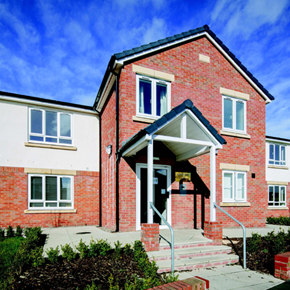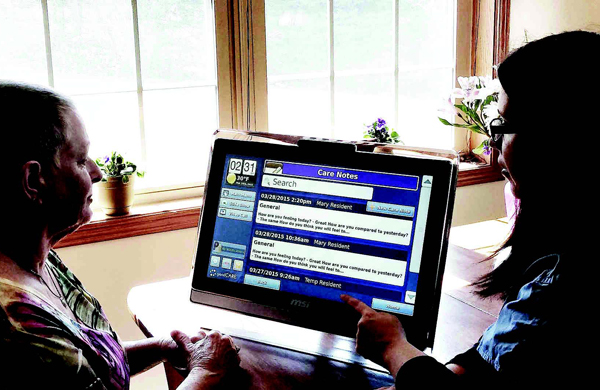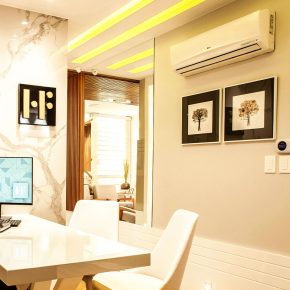
What is the future of disabled living?
In this month’s issue of PSB Magazine, Alastair Sheehan, planning and development director of HB Villages, takes a look at how specialist supported living accommodation will become more high tech over the next five years…
Demand for more suitable, modern housing for people living with disabilities and, in particular, for the elderly, is at an all-time high. This demand is increasing dramatically, as the population continues to grow and people live longer.
This pressure, combined with the harsh economic reality that budgets right across the housing sector are being challenged like never before, means that new ways of funding and developing properties are being deployed.
Rising care costs and ageing buildings only make the task more challenging for private and public sector organisations looking to solve the issues for the most vulnerable in our society.
It is worth taking a closer look at the specialist supported living accommodation sector (housing and care for people who need greater levels of support) which is undergoing a quiet revolution.
A new philosophy of building homes rather than care homes is leading to better outcomes not only fiscally for local authorities but practically for residents of all ages, who are thriving in new-style living accommodation.
Giving people the key to their own front door in a clustered living model is paying dividends for residents and their families. People living in specialist supported living accommodation are empowered – enabling them to meet aspirations to be more (or remain in the case of those post working age) independent. This model allows residents to live in the heart of a community, with dignity that they and all of us deserve.
We are rolling out a sizeable pipeline of specialist supported living schemes across the UK on that basis – and seeing some truly astonishing results with support from local authorities, who recognise the enhanced outcomes, combined with commensurate efficiencies to the Local Care Budgets.

Assistive technology
Technology is playing an increasingly important role in the decision making for local authorities and development partners, who are investing and designing specialist supported living accommodation for the future. It is fundamental to build these developments in a manner which creates flexibility and future-proofing.
With the above in mind, assistive technology, such as that developed by ATEL, is integrated in the building from day one. It is much harder (and massively more expensive) to retro-fit an existing scheme with assistive technology. Far easier and more cost-effective to have it designed and built-in from the outset.
Matthew Warnes, CEO of ATEL, explains the importance of building infrastructure and the latest technology developments launching to the sector:
“The building infrastructure is instrumental in ensuring developments reach their full potential. Through our workings with HB Villages, we have been able to develop our own unique blue print that enables us to meet the demand of other clients, including housing associations and Local Authorities.
“As a fundamental element, the blueprint links design and essential services such as access control, care assist, security and fire safety with our sophisticated enabling infrastructure to provide the foundation for the use of assistive technologies later down the line.
“Examples of how the infrastructure facilitates change easily includes how easily we’re able to change out a standard porcelain toilet for a Clos-o-Mat, which will wash and dry a person after they have been to the toilet, while in a learning disability flat, the shower unit can be replaced with a digital unit so that both time and temperature can be controlled by the care staff.
“Future innovation within supported living and retirement living lies in our Home Halo system. Developed specifically for this sector, Home Halo will assist in the reduction of running costs and building management, along with providing additional benefit to complement service users and the care and safeguarding of residents.
“Having a specifically developed system for the sector provides huge benefits through its ability to go above and beyond a typical building management system. Offering social care and housing associations cost savings through creating sustainably living, it also can manage the health of the building – from maintenance issues through to security. It also features a green light system, which monitors normal daily activity e.g. flushing the loo to notify care staff of individual wellbeing.”
Home Halo for disabled living
 Home Halo system provides care providers and housing associations with a system which:
Home Halo system provides care providers and housing associations with a system which:
- Manages various utility readings and bills;
- Works with green energy to reduce costs, letting users know if the energy they use is free during non-peak times;
- Controls water harvesting and supply to residents;
- Induction and heat recycling to reduce gas bills and limit wasted heat;
- Can be used to switch on/off gas and electricity when people leave/enter their home;
- Central hub for maintenance and can be used to easily identify issues and isolate problems;
- Fire, CCTV, and door access;
- Green light system to monitor daily activity;
- The system can be managed from anywhere in the UK, providing a reduction in the need for staff onsite.
“As the developer of Home Halo, we are able to offer the sector the ability to combine the system with assistive technology including items such as automatic blinds, lighting controls and more advanced technology such as GrandCare.
“GrandCare’s fully customisable features –sensors, communication tools, scheduling, care reporting and healthcare devices – deliver a holistic view of the day-to-day wellbeing and activities of the individual. Activity, or lack of it, is monitored and analysed against a set of individually tailored rules, with a pre-defined list of responses. GrandCare technology can be integrated with Home Halo, using the same touch screens, for a more advanced care package.
“Creating housing of this type, with a layered approach to technology, offers local authorities a wider choice than previously available. Specialist supported housing provides a dual purpose in creating much needed and suitable housing for disabled adults and a care solution, rather than being housing stock that caters for individuals with low level needs only.”
Latest news

25th April 2025
Quicker and Easier Inspections with High Performance FLIR Testing Solutions
FLIR, a Teledyne Technologies company, introduces its PV range of inspection solutions to expedite panel installation and maintenance at solar farms, commercial buildings, and residential buildings.
Posted in Articles, Building Industry News, Building Products & Structures, Building Services, Facility Management & Building Services, Information Technology, Innovations & New Products, Research & Materials Testing, Restoration & Refurbishment, Retrofit & Renovation, Sustainability & Energy Efficiency, Thermal Imaging and Monitors
25th April 2025
Schlüter-Systems: Common costly mistakes when renovating a bathroom
With nearly six decades of experience in the bathroom world, Schlüter-Systems knows all there is to know about the challenges of installing a perfect one!
Posted in Articles, Bathrooms & Toilets, Bathrooms, Bedrooms & Washrooms, Building Industry News, Building Products & Structures, Building Services, Damp & Waterproofing, Drainage, Drainage Services, Drainage, Guttering, Soffits & Fascias, Heating, Ventilation and Air Conditioning - HVAC, Interior Design & Construction, Interiors, Membranes, Pipes & Fittings, Plumbing, Restoration & Refurbishment, Retrofit & Renovation, Walls
25th April 2025
Newcastle United enhances fans’ experience with Stannah escalators
Newcastle United Football Club has introduced two new Stannah escalators as part of a refurbishment of its on-site merchandising outlet.
Posted in Accessibility, Articles, Building Industry News, Building Products & Structures, Building Services, Case Studies, Facility Management & Building Services, Restoration & Refurbishment, Retrofit & Renovation
24th April 2025
Gemini: Using Data Loggers to Help Analyse Environmental Conditions and Energy Usage in Buildings
Gemini Tinytag Data Loggers record environmental parameters over time, allowing conditions to be measured, documented, analysed, and validated.
Posted in Articles, Building Industry News, Building Products & Structures, Building Services, Facility Management & Building Services, Health & Safety, Heating Systems, Controls and Management, Heating, Ventilation and Air Conditioning - HVAC, Information Technology, Research & Materials Testing, Restoration & Refurbishment, Retrofit & Renovation, Sustainability & Energy Efficiency, Thermal Imaging and Monitors
 Sign up:
Sign up: